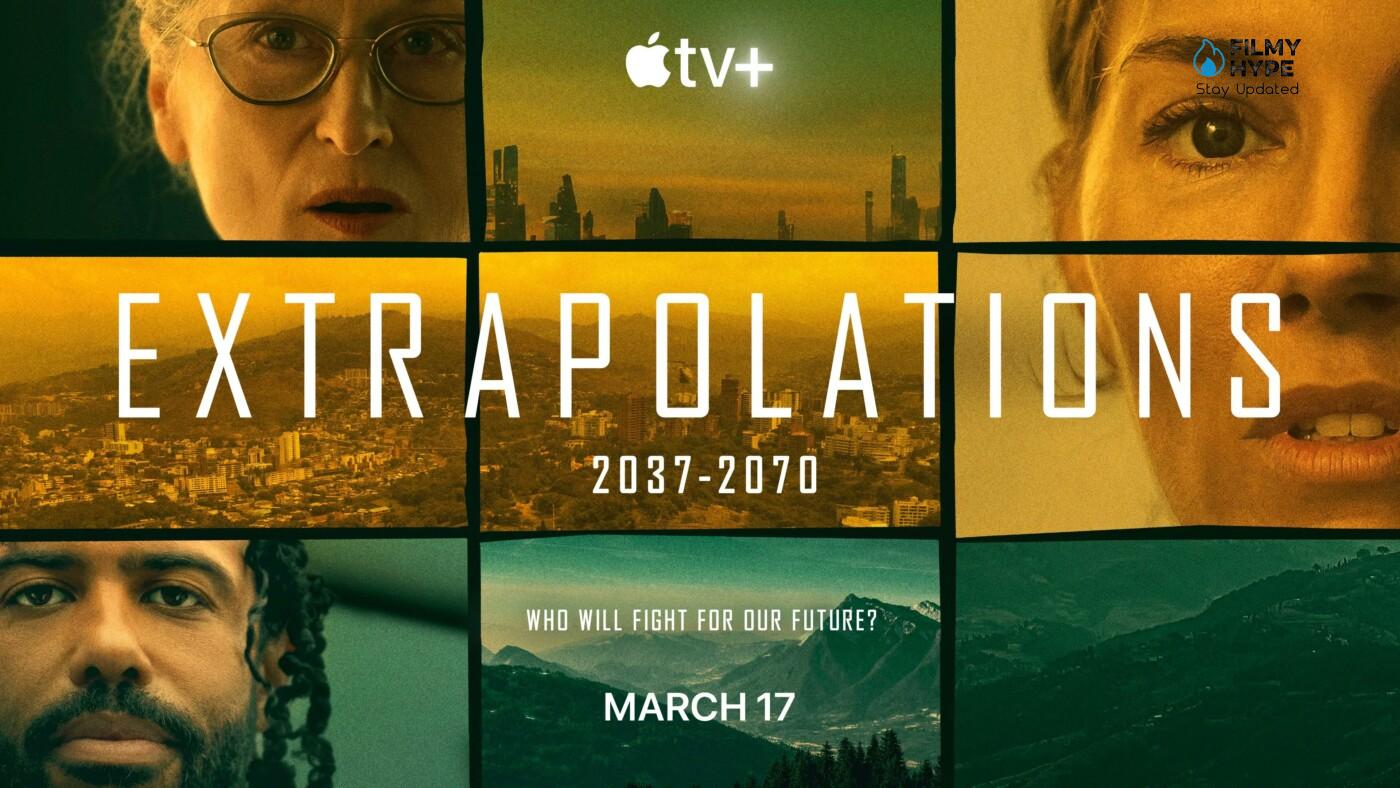Extrapolations Review: In Which the Word “Lie” Does Not Exist | Apple Tv+ Series
Cast: Meryl Streep, Sienna Miller, Kit Harington, Daveed Diggs, Matthew Rhys, Edward Norton, Tobey Maguire, Marion Cotillard, Forest Whitaker
Creator: Scott Z. Burns
Streaming Platform: Apple Tv+
Filmyhype.com Ratings: 4/5 (four stars)
Without any doubt, we can say that the objectives of Extrapolations are clear and straightforward. Already in the first minutes of the first episode, the series puts climate change and the destruction suffered by the environment at the center of the screen; the consequences so feared and repeated millions of times by scientists and experts have finally come to light and shortly, the living conditions on this planet are threatened to say the least by a process of substantial change that is now unstoppable. Against this background stand out the actions of young activists (including demonstrations that resemble in all respects those led by Greta Thunberg) and simple people who struggle with a daily life now made impossible by the conditions.

After the worldwide success of Contagion (2011), a film that returned to the limelight during the Covid period, Scott Z. Burns offers us another “prophetic” creation, which has the ambition to tell us what will happen to mankind soon as a result of climate change and global warming. We are talking about Extrapolations, a TV series in an anthological format which, as the title states, projects estimates and statistics elaborated in the scientific field shortly, showing us the disastrous consequences of our current and future conduct: very soon, for scenarios that we see in the course of the eight episodes, it will not be necessary to speak of “if”, but only of “when”. In short, Burns’ idea is to create a sort of Black Mirror in an ecological key, with a truly exceptional cast: many Hollywood stars have responded to the director’s appeal, from Meryl Streep to Edward Norton, and from Tobey Maguire to Marion Cotillard. Also given the excellent quality of Apple Plus products, the conditions for a masterpiece were all there. How did it go? Here’s our review of Extrapolations, on Apple Plus.
Extrapolations Review: The Story Plot
From 2037 to 2070, planet Earth drastically changes its face: technology has made great strides, and many current problems – such as hostilities between Israelis and Palestinians – have finally been resolved, but climate change is threatening to compromise everything. The Arctic ice caps are melting, entire forests are being destroyed by fires, many animal species are going extinct every year, new diseases are proliferating among children and the ocean is inexorably advancing, inundating Miami and many other coastal cities around the world. The voices of activists continue to rise from the streets, but governments continue to grant exemptions to emissions and there are always those who, like the young tech mogul Nicolas Bilton (a sort of Elon Musk or Jeff Bezos of the future), try to draw profit from the situation.

Meanwhile Rebecca Shearer, on behalf of the Menagerie2100 project, tries to save at least the genetic-biological heritage of endangered species, the young rabbi Marshall Zucker dreams of saving the Miami synagogue from imminent flooding, and the Algerian delegate to the UN Omar Haddad seeks to obtain a desalination device for his country to provide drinking water to his people. On their roads, however, they will meet cynical and unscrupulous individuals such as the corrupt businessman Harris Goldblatt or the despicable fixer Junior, who intends to build a casino in the Arctic lands with all due respect to environmental constraints. In short, humanity continues on its own path, pursuing selfish interests and personal battles without ever grasping the overall design and the urgency of a drastic course correction. Some wonder why God wants to punish humanity, those who wonder what is happening to the planet, and those who roll their eyes praying for a miracle, without understanding that it is only the natural consequences of the actions of the ‘man…
Extrapolations Review and Analysis
Although the eight episodes of the series present various points of contact on the narrative level, Extrapolations is in all respects an anthological telefilm, in which each episode has the task of telling an autonomous and self-contained story. It is a very versatile format, particularly useful in staging a plurality of different events and points of view starting from a great underlying theme, which however presents numerous pitfalls on the screenplay front. A good anthology – from the Decameron to Spoon River and, on TV, from the Twilight Zone to Black Mirror – should stage a mix of solid and incisive stories, capable of leaving a strong and indelible mark on the minds of readers or viewers.
The time available is always very limited, and a plurality of particularly inspired ideas is needed to develop truly iconic and memorable stories. In Extrapolations, on the other hand, despite almost obsessive attention to the packaging (the visual sector is excellent, and the quality of the acting as well) it is the writing that sins: many stories are dull, devoid of bite, and barely sketched, despite the undoubted potential of the original idea. What doesn’t work, in particular, is the construction of the characters: the author devotes much attention to outlining a world consistent with scientific predictions and studied in detail, but he populates it with incredibly two-dimensional individuals, towards whom it is difficult to feel an authentic interest or emotional involvement. The heroes are not convincing, but the antagonists are particularly inconsistent, who very often are reduced to mere stereotyped caricatures: this is the case, for example, of the characters of Junior and Harris Goldblatt. The result is a Manichean distinction between good and bad that rarely manages to make us think…
It’s not just his two-dimensional and poorly characterized characters that make Extrapolations a sensational missed opportunity. The series proposes an undoubtedly powerful and shareable denunciation, and courageously takes sides in defense of our planet, but does so with far too much rhetorical emphasis, ending up involuntarily weakening its message. Instead of letting the images speak, Burns fills the screenplay with monologues, slogans and catchphrases, yielding to an authentic “pedagogical drift”: Extrapolations rarely lets us wander with our thoughts and reflect on what we are seeing, and he prefers to harass us several times with continuous captions, which almost seem to suggest what to think, and how to think it.
The director – former producer of the excellent An Inconvenient Truth, with Al Gore – is genuinely passionate about the subject, but on this occasion, in our opinion, he makes the serious mistake of not detaching himself sufficiently from his work, invading the screen and the story with continuous complaints and proclamations. The comparison with Black Mirror is particularly merciless: the British series has never put a reflection on the dangers of the mass media and new technologies in the mouth of a character, leaving the task of conveying the message to narrative provocations and the power of images. The decision to make the denunciation explicit can work when, at the beginning of the first episode, the speaker is an activist who addresses squares around the world, but the same approach gets out of hand when the same reflections are put into the mouths of many other characters, even in the course of their daily lives. Letting the narration breathe and betting on the simple power of the images would have had much more affection…

What leaves a bitter taste in the mouth the most is that even net of many wrong choices, Extrapolations still manages to give a glimpse of something good, showing us how a little more effort would really have been enough to create an excellent title. in line with the excellent standards to which Apple Plus has accustomed us by now. The photography and image care are superb, and the acting performances of its cast, from Meryl Streep to Edward Norton, are as impeccable as ever. All in all, even the intuitions behind the individual episodes work, and it is impossible not to be genuinely indignant at the machinations behind the scenes of the UN summit in the first episode, or the Menagerie2100 project in the second, not to mention the tragic dilemma that plagues Rabbi Marshall Zucker in the third installment.
The problem is that all these good impromptu elements always and only speak to the viewer’s brain, without ever reaching the heart: the series is too artificial to move and too rhetorical to excite. Nonetheless, we urge readers to take a look in person at Extrapolations valuable ideas are not lacking, and could certainly fascinate lovers of the theme. The regret, however, remains very strong… Extrapolations also play on an almost childish construction of the characters, which almost always become caricatured and hyperbolic, but this always happens to intend to construct a story that is immediately recognizable, in which there is no possibility of misunderstanding the intentions of each of the characters and the only feasible solution.
Thus, in the same direction, the continuous comparisons between the human and animal worlds also proceed, in which the word “lie” does not exist, in which deception against one’s fellow humans is not even conceivable, once again emphasizing the inadequacy with which humanity has taken control of the world. Between animal species that become mythological creatures, protagonists of a time long gone, and unscrupulous industrial plans, Extrapolations tells in frank and direct language how the world is destined to appear in a few years. The doubt with which the series travels the whole world is whether humanity can recognize the point of no return and how much we are willing to compromise ourselves in order not to get there.
Extrapolations Review: The Last Words
We face a terrible future, but we still have time to save it and protect what is left of Planet Earth if we realize that we can also be the solution rather than just the problem. This comes from the review of Extrapolations, which has a stellar cast that was well-chosen and distributed across eight episodes that become anthological and are connected by kinship ties and plot twists, as well as a staging that was good for directing, editing, and taking pictures. A brand-new Apple Tv+ gem that is difficult to digest for all serial fans. Extrapolations try to decline the anthological formula that made Black Mirror’s fortune in a green key, but the author does not pay enough attention to his characters and borders on rhetoric, wasting the talent of an exceptional cast: an opportunity conspicuously missed!







